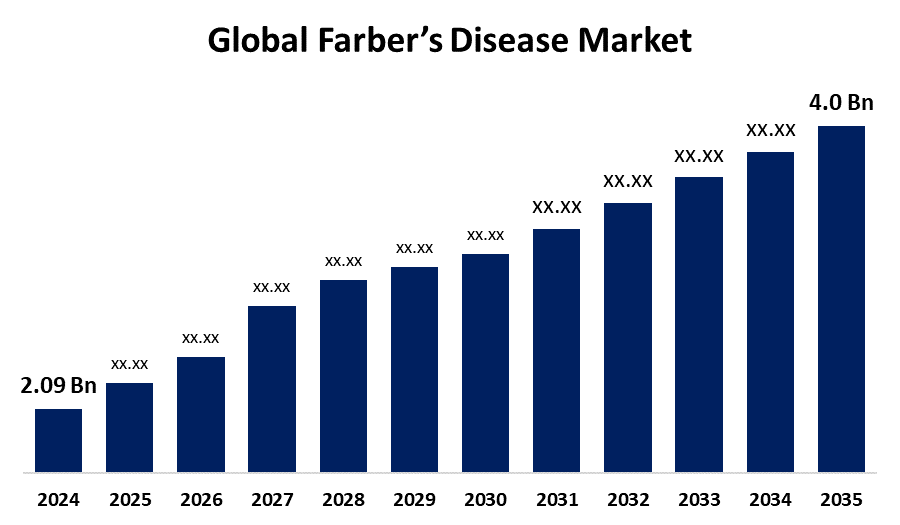- As per Spherical Insights & Consulting, the Global Farber’s Disease Market Size is expected to grow from USD 2.09 Billion in 2024 to USD 4.0 Billion by 2035, at a CAGR of 6.08% during the forecast period 2025-2035, owing to the launch of new therapies in the market and the rise in the number of cases.
- The leading Farbers Disease Market Companies such as GlaxoSmithKline plc, Glenmark Pharmaceuticals Ltd, Enzyvant, Teva Pharmaceutical Industries Ltd, Boehringer Ingelheim International GmbH, Endo Pharmaceuticals Inc, Pfizer Inc, Novartis AG, Takeda Pharmaceutical Company Limited, WOCKHARDT, Kowa Pharmaceuticals America, Merck & Co, Impax Laboratories, F. Hoffmann-La Roche Ltd, and Others.

Farber’s Disease Treatment Market: Understanding and Treatment Algorithm:
Farber’s Disease is a rare genetic lysosomal storage disorder caused by acid ceramidase deficiency. It leads to harmful ceramide buildup in tissues, causing painful joint swelling, skin nodules, and progressive neurological decline. The disease is typically fatal in early childhood, with no approved cure, requiring supportive and experimental treatments.
Farber’s Disease Diagnosis:
Farber’s Disease diagnosis involves clinical evaluation of symptoms like joint pain and nodules, combined with laboratory tests measuring acid ceramidase enzyme activity. Genetic testing identifies mutations in the ASAH1 gene. Imaging and biopsy may support diagnosis by revealing tissue abnormalities. Early detection is critical for managing this progressive disorder.
Farber’s Disease Treatment
Farber’s Disease treatment focuses on managing symptoms and slowing progression. Enzyme replacement therapy and gene therapy are under development to address the enzyme deficiency. Supportive care includes pain management, physical therapy, and surgery for joint issues. Currently, no approved cure exists, making clinical trials vital for new options.
Farber’s Disease Epidemiology
The disease epidemiology covered in the report provides historical as well as forecasted epidemiology segmented by Total Diagnosed Incident Population of Farber’s Disease, Gender-specific Diagnosed Incidence of Farber’s Disease, Type-specific Diagnosed Incidence of Farber’s Disease, Age-specific Diagnosed Incidence of Farber’s Disease, Diagnosed Incident Population based on Primary Site of Farber’s Disease, and Diagnosed Incident Population based on Histologic Classification of Farber’s Disease Tumour in the global market covering North America, Europe, Asia-Pacific, Latin America, the Middle East, and Africa from 2024 to 2035.
Principal Insights
This section offers a global overview of Farber’s Disease epidemiology in major markets worldwide.
Country Wise- Farber’s Disease Multiforme Epidemiology
- The epidemiology segment provides Farber’s Disease prevalence data and findings across key regions worldwide, including North America, Europe (Germany, France, Italy, Spain, and the United Kingdom), Asia-Pacific (including Japan), Latin America, the Middle East, and Africa.
Fathers Disease: Recent Development:
- In may 2023, Acreage acquired Enayat investigational enzyme replacement RVT 801 (renamed ACG 801) for Fathers Disease and secured a 35 million products financing deal with Nova Quest to support its development towards clinical trials. The transaction included an upfront payment, milestones based payment up to 226 million and Roche style royalty.
Farber’s Disease Marketed Drugs:
- RVT-801 (ACG-801): Aceragen
RVT-801 is an investigational enzyme replacement therapy designed to treat Farber’s Disease by supplementing deficient acid ceramidase. It aims to reduce ceramide buildup, alleviating symptoms such as joint pain and inflammation. The drug has received orphan drug designation and is currently in clinical development.
Arimoclomol is a small molecule that enhances heat shock protein production to reduce cellular stress and inflammation. It is being repurposed for Farber’s Disease treatment under orphan drug status and is in early clinical trials.
RGX-202 is an experimental gene therapy using adeno-associated virus (AAV) vectors to deliver a functional ASAH1 gene, aiming to restore acid ceramidase production in patients. It targets the root cause of Farber’s Disease and is in preclinical or early clinical development.
Farber’s Disease: Emerging Therapies
- Arimoclomol: Arimoclomol is a small molecule that amplifies the heat shock response, helping to stabilize misfolded proteins and reduce inflammation. It is being repurposed for Farber’s Disease under an orphan drug designation, aiming to slow disease progression by enhancing cellular stress responses.
- Gene Therapy (Regenxbio RGX-202): Regenxbio is developing RGX-202, an AAV-based gene therapy delivering a functional ASAH1 gene. It aims to provide a long-term, possibly curative treatment by restoring acid ceramidase activity. This therapy is currently in preclinical or early clinical phases.
- Small Molecule Therapies: Several biotech firms are exploring small molecules that can reduce ceramide accumulation or modulate related metabolic pathways, aiming to provide oral, less invasive treatment options compared to enzyme replacement.
- ACG-801: ACG-801 is an investigational enzyme replacement therapy designed to supplement deficient acid ceramidase in Farber’s Disease patients. It aims to reduce ceramide buildup and alleviate symptoms. Currently in clinical development, ACG-801 offers a promising therapeutic approach targeting the root cause of the disease.
Farber’s Disease Market Outlook
- Farber’s Disease market refers to the global landscape of diagnostics, therapeutics, and research focused on treating this ultra-rare lysosomal storage disorder. It includes enzyme replacement therapies, gene therapies, and supportive treatments aimed at managing inflammation, joint pain, and neurological symptoms caused by ceramide accumulation.
- The market is driven by increasing awareness of rare diseases, advancements in genetic testing, and growing investment in enzyme replacement and gene therapy research. Supportive regulatory frameworks and orphan drug designations further accelerate innovation and development of targeted therapies for Farber’s Disease.
- Opportunities lie in expanding early diagnostic tools, initiating global newborn screening programs, and advancing clinical trials for curative gene therapies. Partnerships between biotech firms and academic institutions offer potential breakthroughs. Increased funding for rare diseases enhances the potential for therapeutic development in this underserved segment.
- Governments support rare disease markets through orphan drug incentives, fast-track approvals, and research grants. Initiatives like patient registries, rare disease consortia, and funding for gene therapy innovation contribute to better disease awareness, early diagnosis, and accelerated drug development.
- Limited patient population restricts commercial viability and clinical trial scalability.
- The market is expected to grow due to increasing focus on gene therapy and enzyme replacement as curative approaches.
Farber’s Disease Market Segmentation
By Type of Farber's Disease:
- Classical Farber's Disease
- Non-Classical Farber's Disease

Classical Farber’s Disease holds the largest market share due to its early and severe clinical manifestation, leading to quicker diagnosis and medical intervention. It is more commonly reported and studied, which drives therapeutic focus, research funding, and treatment demand, making it the dominant segment within the Farber’s Disease market.
By Age of Onset:
- Infantile-Onset Farber's Disease
- Late-Onset Farber's Disease

Infantile-Onset Farber’s Disease accounts for the largest share due to the rapid progression and early diagnosis during infancy. This form typically presents with more aggressive symptoms, prompting earlier medical attention and therapeutic interventions. As a result, healthcare providers prioritize early treatment, driving higher demand in this age-related segment.
Regional Segment Analysis of the Farber’s Disease Market
North America holds the largest share in the Farber’s Disease market due to advanced healthcare infrastructure, strong rare disease awareness, and well-established diagnostic facilities. The region benefits from significant investments in research and development, availability of orphan drug incentives, and early adoption of innovative therapies. Moreover, the presence of leading pharmaceutical companies and robust reimbursement policies drives market growth and patient access to emerging treatments in this region.
Asia-Pacific is the fastest growing region in the Farber’s Disease market, driven by increasing healthcare expenditure, improving diagnostic capabilities, and rising rare disease awareness. Expanding government initiatives and growing partnerships between local and global biopharmaceutical companies contribute to accelerating clinical trials and therapy availability. Additionally, increasing patient population and enhanced regulatory support boost demand for novel treatments and propel market growth in countries like China, India, and Japan.
Farber’s Disease Market Key Companies
- GlaxoSmithKline plc
- Glenmark Pharmaceuticals Ltd
- Enzyvant
- Teva Pharmaceutical Industries Ltd
- Boehringer Ingelheim International GmbH
- Endo Pharmaceuticals Inc
- Pfizer Inc
- Novartis AG
- Takeda Pharmaceutical Company Limited
- WOCKHARDT
- Kowa Pharmaceuticals America
- Merck & Co
- Impax Laboratories
- F. Hoffmann-La Roche Ltd
- Others
Farber’s Disease Therapeutics Market Report Scope
- The Farber’s Disease therapeutics market report provides a detailed overview, covering its causes, symptoms, disease progression, and existing treatment options.
- Detailed insights into Farber’s Disease’s epidemiology and therapeutic approaches are included.
- Additionally, a comprehensive review of existing and emerging Farber’s Disease therapies is provided, including an evaluation of new treatments expected to influence the current Farber’s Disease treatment market landscape.
- The report includes a detailed review of the Farber’s Disease therapeutics market, both historical and forecasted, highlighting the global drug reach.
- The Patient-Based Farber’s Disease Market Forecasting report offers valuable insights into trends shaping the global Farber’s Disease market, helping to develop effective business strategies.
Farber’s Disease Treatment Market Report Insights
- Forecasting Market Trends Based on Patient Data and Disease Rates
- Farber’s Disease Therapeutic Approaches in Farber’s Disease
- Review Of Drugs in Development for Farber’s Disease
- Market, Growth, and Trends in Farber’s Disease
- Market Opportunities in Farber’s Disease Treatment
- Effects Of Future Therapies on Farber’s Disease Treatment.
Farber’s Disease Treatment Market Report Key Strengths
- 15 Years Farber’s Disease Market Forecast
- Global Coverage
- Farber’s Disease Epidemiology Segmentation
- Key Cross Competition
Farber’s Disease Treatment Market Report Assessment
- Present Practices in the Farber’s Disease Treatment Market
- Review of Investigational Farber’s Disease Drugs
- Attractiveness of the Farber’s Disease Drug Market
- Farber’s Disease Market Drivers
- Farber’s Disease Market Barriers
- SWOT
- Attribute Analysis
Market Segment
This study forecasts revenue at the global, regional, and country levels from 2020 to 2035. Spherical Insights has segmented the Farber’s Disease market based on the below-mentioned segments:
Global Farber’s Disease Market, By Type of Farber's Disease
- Classical Farber's Disease
- Non-Classical Farber's Disease
Global Farber’s Disease Market, By Age of Onset
- Infantile-Onset Farber's Disease
- Late-Onset Farber's Disease
Global Farber’s Disease Market, By Regional Analysis
- North America
- Europe
- Germany
- UK
- France
- Italy
- Spain
- Russia
- Rest of Europe
- Asia Pacific
- China
- Japan
- India
- South Korea
- Australia
- Rest of Asia Pacific
- South America
- Brazil
- Argentina
- Rest of South America
- Middle East & Africa
- UAE
- Saudi Arabia
- Qatar
- South Africa
- Rest of the Middle East & Africa






